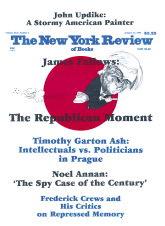In response to:
Giving the Devil His Due from the December 1, 1994 issue
To the Editors:
Michael Meyer devotes the greater part of a long review to Professor John Fuegi’s Brecht and Company, a 732-page work already published in England under the title The Life and Lies of Bertolt Brecht. He cites me in the first column as believing that “at least seven of the eleven ‘Berlin’ stories” (in the book of Brecht Short Stories 1921-1946 in Manheim’s and my collected edition) are by Brecht’s collaborator Elisabeth Hauptmann.
This is not what I say in the article referred to. It’s what Fuegi says I say. And Fuegi has misquoted. I was speaking of the fourteen “Berlin” stories in our selection, as compared with seven other stories published elsewhere under Hauptmann’s name which in my judgement were “thematically and stylistically indistinguishable” from Brecht’s fourteen. Fuegi accuses Manheim and me of publishing her work as being by Brecht. But those seven stories were neither published by us nor attributed to Brecht. So I would be glad if this could be corrected.
On the same page another quote mentions the manuscript of Brecht’s “Benares Song,” on whose script, it is said, “Hauptmann wrote at the time” claiming its authorship. This again involves a misreading of me by Fuegi, which Meyer accepts without question. The claim, while surely right in itself, was not made “at the time” but (as I reported) on a photocopy dating from some thirty years later. The slip is not uncharacteristic.
Baal, in the play of that name, is described in your review as a “murderer.” Fuegi has him murdering the wrong character. The young Brecht, at the foot of your column 4, “had a habit of urinating into baskets of clean laundry to save going downstairs to the ground floor toilet.” This dainty generalisation, again put forward without question, is based on the startling mistranslation of a well-known poem, where it is just the damp laundry that is dripping in the attic.
It is a pity that Meyer, who is so sharp to comment on the loose writing and the unchecked errors in Fuegi’s English grammar and syntax, has accepted the substance of a book whose structure is wormeaten with at least 450 rather more telling mistakes and repetitions. While queasy about its language, he seems to have felt no hesitation about passing on its often wobbly allegations to your readers. Alas, he missed seeing that there could be a lesson here in the relationship between scholarly scruples and a care for words. Be a little less trusting, prod this book’s vast assemblage of notes, and it crumbles.
John Willett
London, England
This Issue
January 12, 1995



